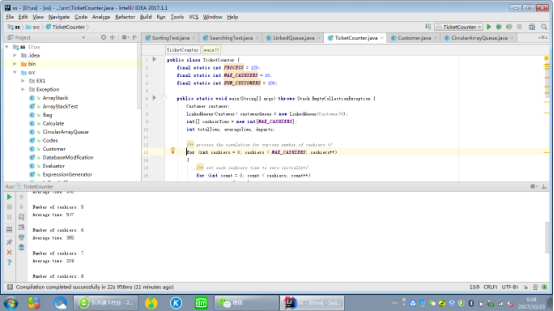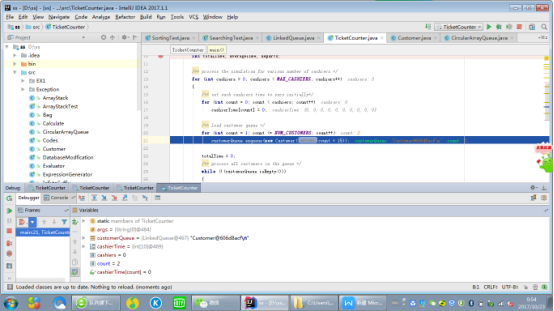实验要求
1 补充课上没有完成的作业
2 参考15.3节,用自己完成的队列(链队,循环数组队列)实现模拟票务柜台排队功能
3 用JDB或IDEA单步跟踪排队情况,画出队列变化图,包含自己的学号信息
4 把代码推送到代码托管平台
5 把完成过程写一篇博客:重点是单步跟踪过程和遇到的问题及解决过程
6 提交博客链接
实验过程
一、补充教材15.5代码。
-
1、dequeue方法:
按照队列中元素先进先出(FIFO)的方式,dequeue从队头删除元素,先查询队列是否为空,若为空,则直接打印;若不为空,则返回第一个元素,指针指向下一元素。 -
代码如下:
public T dequeue() throws Stack.EmptyCollectionException {
if (count == 0) {
System.out.println("The queue is empty");
return null;
}
else {
T result = front.getElement();
front = front.getNext();
count--;
return result;
}
} -
2、first方法:
检测队列中的第一个元素,先判断队列是否为空,若为空就提示队列为空;若不为空,则返回队列的第一个元素。 -
代码如下:
public T first() throws Stack.EmptyCollectionException {
if (count == 0){
throw new Stack.EmptyCollectionException("The queue is empty.");
}
return front.getElement();
} -
3、isEmpty方法:
判断队列是否为空,为空则返回true,不为空则返回false -
代码如下:
public boolean isEmpty() {
return count == 0;
} -
4、toString方法:
将队列中各元素转化为String类型 -
代码如下:
public String toString(){
String result = "";
LinearNodecurrent = front; while (current != null) { result = result + (current.getElement()).toString() + " "; current = current.getNext(); } return result; }}
运行截图和单步跟踪如下

